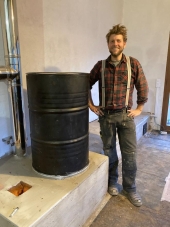Benjamin Dinkel wrote:It's on a first floor and the architect calculated a maximal weight of 300 kg/m2 or 62 pounds per square foot.
The calculated loads on concrete floors have always raise an eyebrow for me. I deal with it somewhat regularly with the equipment we install at different locations. Sometimes we have an engineer run calcs to tell us the psf an existing floor can take.
A monolithic house slab 4" thick typically has a 40 psf rating. Most driveways and garages are 4". An average weight car/light truck is 3000 to 5000 pounds. Because a light truck footprint is 80"x240" (134 sqft) and 134 sqft x 40 psf = 5360 pounds, you can park it on the same slab even though the tires are making contact on less than 4sqft.
In one sense, it is too bad an architect was consulted. That house slab must be fairly thick or have some good reinforcement to have 62 psf rating. You probably could have parked a large masonry heater in a smaller footprint and still not have loading issues (actual in the field, not in calculations and on paper).
There are risks associated with consulting a design professional and risks associated with not contacting a design professional.








